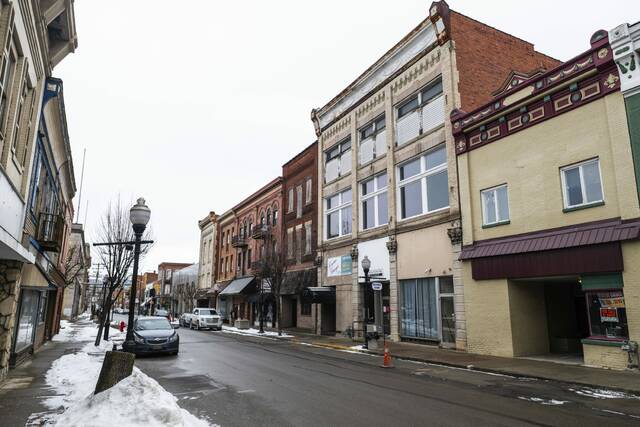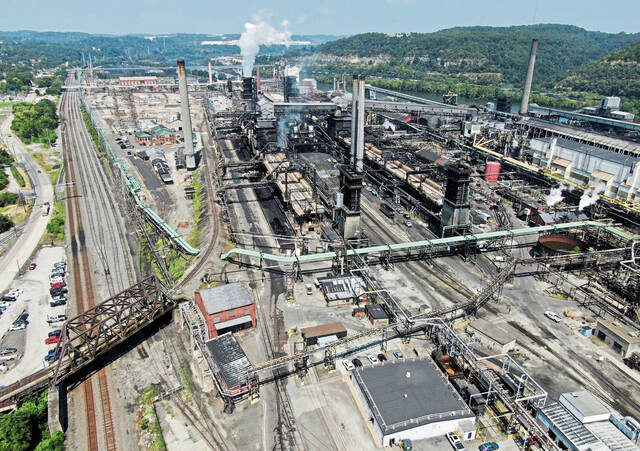With the future of U.S. Steel’s Mon Valley mills murky at best because of President Joe Biden’s decision to block the proposed sale to Japan’s Nippon Steel, observers and industry analysts offered a glimpse of what might happen as both companies decried Biden’s decision.
“I don’t think there is any way of knowing right now what the future holds for legacy steel production in the Mon Valley,” said Chris Briem, a regional economist with the University of Pittsburgh’s Center for Social and Urban Research. “The steel plants in the Mon Valley are among the oldest such facilities in the nation, and their future is dependent on new investment to keep them operating. What firms are willing to make that investment is a large unknown.”
Paul Sracic, a professor of humanities and social sciences at Youngstown State University, about 60 miles north of Pittsburgh, has done extensive research on the proposed deal.
He’s based in a city that has weathered the collapse of its steel industry since the late 1970s.
The Nippon deal would have offered what Sracic said could be the best hope to preserve jobs at U.S. Steel’s plants in Braddock, Clairton and West Mifflin, along with the company’s headquarters in Pittsburgh’s Golden Triangle.
“These (Mon Valley plants) are the ones that won’t remain open,” Sracic said.
Nippon pledged to invest about $2.7 billion in U.S. Steel.
Without that infusion of cash, U.S. Steel CEO David Burritt told the Wall Street Journal steel mills likely will be closed and production could be moved to Arkansas.
U.S. Steel did not have the money to modernize its aging mills and the move likely would put an end to Pittsburgh as the company’s headquarters, Burritt said.
But the situation remains fluid as both companies and politicians have offered only rhetoric and have not revealed their next steps.
U.S. Steel has a strong position, so the impact may not be immediate, said Laura Hodges, a U.S. steel market consultant for the United Kingdom-based MEPS International.
The Biden administration made the wrong move because it leaves an uncertain future for steelmaking in Southwestern Pennsylvania, said Allegheny Conference CEO Stefani Pashman.
The Allegheny Conference coordinates economic development for and promotes the Pittsburgh region. It was founded in 1944 to make plans for post-World War II Pittsburgh, in a time when the city’s industrial prowess was legendary and the sooty cityscape that glowed with molten steel was likened to hell with the lid off.
The group now serves the 10-county region, including Armstrong, Beaver, Butler, Fayette, Greene, Indiana, Lawrence, Washington and Westmoreland counties.
“Nippon made specific commitments that should have been embraced — maintaining a regional headquarters, investing in upgrading facilities and growing jobs in the Mon Valley,” Pashman said.
Earlier in the week, the conference released a statement that they were hard-pressed to understand how elected officials in Washington, D.C., could abandon the region and threaten the deal when they aren’t going to modernize the steel factories or replace the lost jobs. The region’s steel industry has shed some 75,000 job in the past 45 years — from about 90,000 to just 16,000, Pashman said.
“Simply put, we are concerned there is no Plan B that proposes similar or greater value to our region,” Pashman said.
Blocking a deal that has pledges of almost $3 billion of investment, including updating the Mon Valley mills, brings back memories of Youngstown’s decline for Sracic.
Some people in the Mahoning Valley who can remember Sept. 19, 1977, know it as Black Monday because it’s when Youngstown Sheet & Tube Co. laid off 5,000 people, Sracic said.
“The truth was, it was caused by a lack of investment. It was not foreign imports. I don’t want to see what happened to the Mahoning Valley happen to the Mon Valley,” said Sracic, who co-authored a lengthy research paper on the impact of the U.S. Steel-Nippon deal.
Opponents of the deal sowed seeds of fear that Nippon Steel would close its U.S. Steel mills.
“It doesn’t make any sense to commit billions of dollars just to shut them down. They’re not going to ship them to Japan,” Sracic said.
And there is the matter of politics that played a role in the decision, Sracic said. Biden had pledged to block the deal, and so did Vice President Kamala Harris and then-Republican presidential nominee Donald Trump.
“First of all, it was the name — U.S. Steel — the backbone of American industry,” Sracic said.
Trump’s opposition, Sracic pointed out, is in contrast to his stated claim that he wants foreign investment in the United States.
“This is just foolish,” Sracic said.
Related:
• U.S. Steel, Nippon say Biden's decision to block sale was 'political'• What they're saying about it: U.S. Steel-Nippon deal blocked
• Read Biden's statement about decision to block sale of U.S. Steel
• Read Nippon Steel's statement about Biden's decision to block sale of U.S. Steel
Even with the new investment that Nippon Steel had promised if it merged with U.S. Steel, there is no real prospect that the region can expect to expand steel production or jobs, Briem said.
U.S. Steel opted to invest $412 million four years ago in a new electric arc furnace at its Fairfield, Ala., plant, shifting its focus to newer technologies for steel production, Briem said. The electric arc furnace produces steel using scrap metal, thus avoiding the need to burn coal into coke for carbon-based steel production.
With the government blocking Nippon Steel’s bid, Briem is not optimistic another buyer will step up and purchase U.S. Steel’s operations.
“It is possible the assets get broken up and sold off to different firms. If that is the case, what happens to the plants of the Mon Valley is the most uncertain,” Briem said.
U.S. Steel in August 2023 rejected an unsolicited bid valued at $7.3 billion from Cleveland-Cliffs Inc., a Cleveland-based steelmaker whose operations include plants at Steelton and Butler, as well as the coke-producing plant in Monessen, formerly owned by Wheeling-Pittsburgh Steel Corp. Nippon countered with a bid valued at $14.7 billion in late 2023.
After the company’s bid was rejected and before the Biden decision, Cleveland-Cliffs CEO Lourenco Goncalves had said his company still was interested in acquiring U.S. Steel and keeping it under domestic control.
Because of anti-trust concerns, Sracic said, he does not see where Cleveland-Cliffs could acquire all of U.S. Steel’s mills because that would create a monopoly in the domestic steel supply for the auto industry. The electric arc furnaces do not make the grade of steel that is sought by the auto industry.
Patricia Persico, a Cleveland-Cliffs spokeswoman, could not be reached for comment Friday.
U.S. Steel stock plunged 6.5% and ended trading at $30.47 per share. Nippon stock closed at $6.92 per share, down three-quarters of a percentage point.








